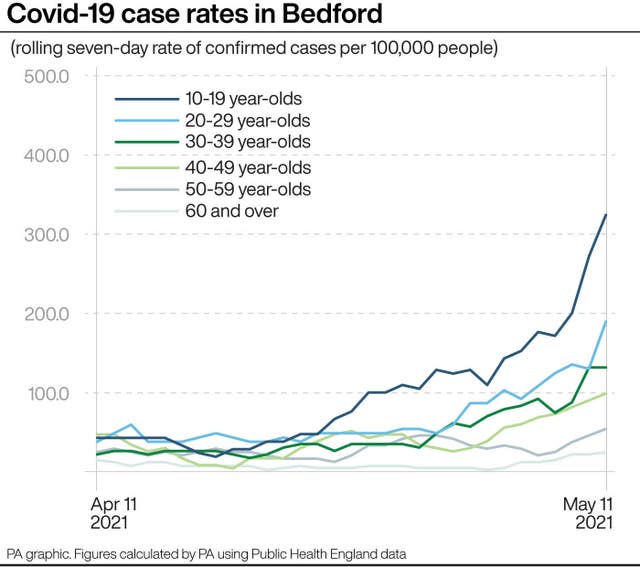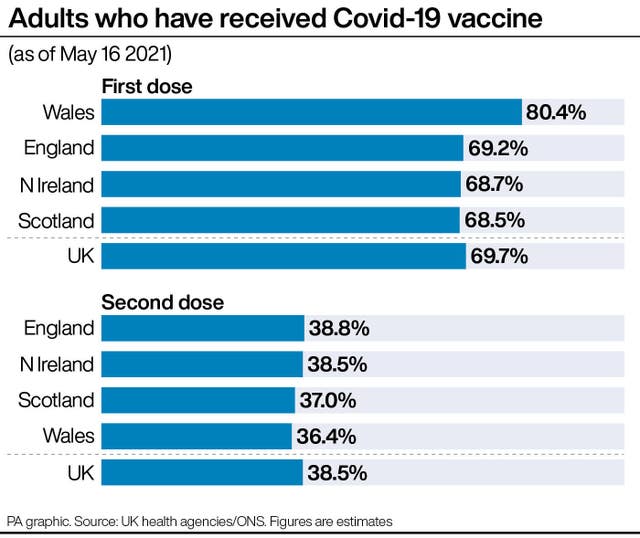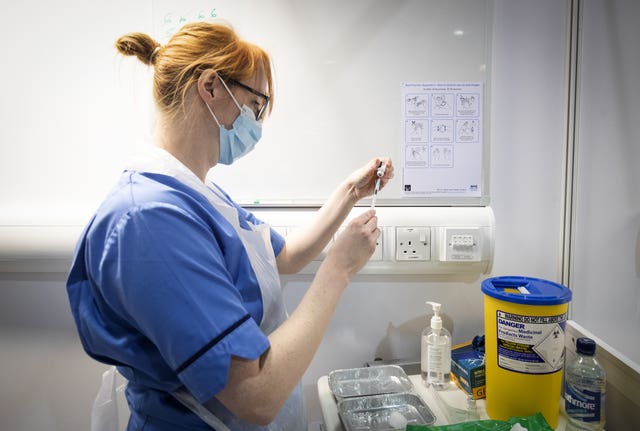
Further cases of the Indian coronavirus variant have been identified in the UK, with 86 local authorities now reporting five or more confirmed cases, ministers have said.
Health Secretary Matt Hancock told the House of Commons on Monday that while the B1617.2 variant seemed more transmissible, the evidence suggested vaccines were effective against it.
Mr Hancock said the variant had become the dominant strain in parts of the North West of England.
A range of measures are being taken to tackle its spread, including accelerating second doses of vaccines for people over 50 and the clinically vulnerable, he added.
– How many cases have been detected in the UK?
Mr Hancock told the Commons there were now 2,323 confirmed cases of B1617.2 in the UK – of which 483 were in Bolton and Blackburn with Darwen, where it is now the dominant strain.
He said cases there had doubled in the last week and were rising in all age groups.
Mr Hancock also told MPs there were 86 local authorities where there are five or more confirmed cases, with Bedford the “next biggest cause of concern”.
 (PA Graphics)
(PA Graphics)
His statement comes after data from Public Health England (PHE) published on Thursday showed a steep rise in cases associated with B1617.2, which has been designated as a “variant of concern”, from 520 last week to 1,313.
Prime Minister Boris Johnson has previously said the variant could pose a “serious disruption to our progress” coming out of lockdown.
– Is this surge leading to more hospital admissions and deaths?
Mr Hancock said that in Blackburn hospital admissions were “stable”, with eight people currently in hospital with Covid.
In Bolton, 19 people were in hospital with coronavirus – the majority of whom were eligible for a vaccine but had not received one, he added.
Blackburn with Darwen’s director of public health Professor Dominic Harrison has said rising cases are unlikely to lead to increased deaths and hospital admissions, but that the situation will be monitored daily.
– Is the Indian variant more transmissible?
Informing MPs of the latest scientific assessment on the Indian variant, the Health Secretary said early evidence suggested the variant was more transmissible than the Kent variant.
 (PA Graphics)
(PA Graphics)
He added that it was not yet known how much more transmissible it was.
The Scientific Advisory Group for emergencies (Sage) has said there is a “realistic possibility” that the Indian coronavirus variant could be as much as “50% more transmissible” than the Kent strain.
But, at present, there is no evidence the B1617.2 variant is resistant to current vaccines.
Mr Hancock said that early laboratory data from Oxford University corroborated the evidence from Bolton Hospital and the initial observational data from India that vaccines are effective against this variant.
He added that whilst this is “reassuring”, the higher transmission rate “poses a real risk”.
– What is being done?
Mr Hancock said the Government had “surged in” its rapid response team to Bolton and Blackburn, with a team of 100 people visiting around 35,000 people to distribute and collect tests.
 A nurse prepares a coronavirus vaccine (Jane Barlow/PA)
A nurse prepares a coronavirus vaccine (Jane Barlow/PA)
He also said six new testing units had been installed, 50 new vaccinators brought in and two new vaccination centres opened as well as extending the opening hours and capacity of existing sites.
Over the weekend, the rate of vaccination in Bolton quadrupled, with 6,200 people getting the jab.
Mr Hancock also confirmed surge testing will take place in Bedford after a rise in Indian variant cases of coronavirus.
Mr Johnson told a Downing Street press conference last week that second doses – which give people maximum protection against Covid-19 – will also be brought forward from the planned 12-week interval to eight weeks.
First doses are also being prioritised for anyone eligible who has not yet come forward including the over-40s.
Prof Whitty said local “surge vaccinations”, which would make first doses more widely available by offering them to all over-18s, was not being pursued because there is a “finite” supply of doses and that younger people were at less risk from the virus.
Mr Hancock said that people taking up their offer of a vaccine “will help us all get out of this pandemic” and announced that people aged 37 will be offered the vaccine from Tuesday.
He added: “The approach is to make sure we get as many second vaccinations done as possible, as many first vaccinations amongst the vulnerable groups, and then as many vaccinations as possible for those eligible groups who are under the age of 50.”
– Will bringing forward second jabs help tackle the rise?
When the national vaccine programme began in the UK, officials took the bold decision to delay administering booster shots so that elderly and vulnerable people could more quickly receive their first shots.
Studies have since shown that giving the second dose 12 weeks after the first, instead of 21 days, can produce a stronger immune response.
Thus, it remains to be seen whether bringing forward the date of the second dose will help curb rising infections.
– What other variants of concern have been identified in the UK?
All viruses undergo small genetic changes as they make copies of themselves in the host.
Most of these mutations are harmless but some can make the disease more infectious or threatening, and evade protection gained through infection or vaccination.
The #COVID19 Dashboard has been updated: https://t.co/XhspoyTG79
On 17 May, 1,979 new cases and 5 deaths within 28 days of a positive test were reported across the UK.
36,704,672 people have now received the first dose of a #vaccine and 20,287,403 have received a 2nd dose. pic.twitter.com/t3P6dip3be
— Public Health England (@PHE_uk) May 17, 2021
PHE has designated the UK, India, South Africa and Brazil (P1) variants as being “of concern”.
Current vaccines have been designed for earlier versions of coronavirus, but scientists believe they should still work, but may be less effective.
But experts are confident existing vaccines can be tweaked to better tackle emerging mutations.
The UK Government has a deal with biopharmaceutical company CureVac to develop vaccines against future variants, and has pre-ordered 50 million doses.


Comments: Our rules
We want our comments to be a lively and valuable part of our community - a place where readers can debate and engage with the most important local issues. The ability to comment on our stories is a privilege, not a right, however, and that privilege may be withdrawn if it is abused or misused.
Please report any comments that break our rules.
Read the rules here